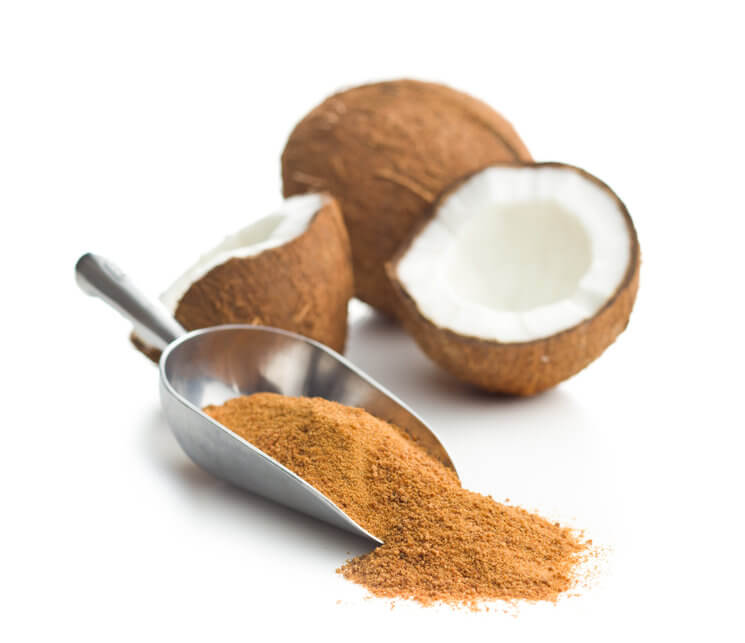There is no doubt how much we humans love sugar and it is for good reason. It is sweet and delicious, and we crave it. But sugar has gotten a bad rap in more recent times, and people now often choose more natural and less processed sweeteners believed by many to be healthier options. As a result, both date sugar and coconut sugar are very popular and widely used all around the world. Here we will further examine date sugar vs coconut sugar and how they compare to each other. And if one is better than the other.
Although similar, date sugar and coconut sugar do differ slightly in taste, texture, sweetness, and nutritional value.
Date sugar is very sweet with a hint of butterscotch flavor to it. The texture is smooth and soft but will not melt or dissolve fully in hot liquids. Because the whole date is used to make the sugar, there are always tiny fibrous bits left behind. That does result it in its uses being somewhat limited.
On the other hand, coconut sugar is not used from the coconut, but the coconut tree sap. Therefore, it tastes nothing like the coconut as one may think. It may be described as having a slight nutty flavor with hints of caramel. It is a good substitute for brown sugar as it has a similar texture and melts perfectly fine. We will see the differences in nutritional value coming up, but it should be noted that it is a marginal difference.
What Is Date Sugar?

Date sugar simply comes from whole pitted dates. The dates are ground into a paste and then combined with a common food additive called maltodextrin. The mixture is oven dried and made into powdery granules similar looking to sugar except it is not bleached white.
Since the whole date is used, date sugar contains the fiber and antioxidants found in the dates. And it is considered one of the healthier options to conventional white table sugar. It is a good substitute for brown sugar in baking.
What Is Coconut Sugar?

Coconut sugar, also known as palm sugar, is made by cutting into the flower on the coconut palm tree and collecting the sap, bringing it to a boil, and letting it dry out and crystallize. It is then broken apart into smaller crystals that resemble conventional sugar except is also not bleached white. Coconut sugar is a very popular sweetener and is also deemed a healthier option to conventional table sugar.
Date Sugar VS Coconut Sugar
If you look at date sugar vs coconut sugar, both are similar in that they are sweet, minimally processed and relatively low in calories. Both sugars make a good substitute for white sugar and brown sugar. Compared side by side date sugar retains slightly more nutritional value, although it is a marginal difference. Texture wise, coconut sugar could be the better choice because it melts and fully dissolves leaving you with more options to use it. Taste wise they are both sweet in flavor but whether one tastes better than the other is up to the individual.
Nutrition
Let’s have a look at how the two compare in terms of nutrition facts.
A 2 tsp serving of date sugar contains:
- Calories: 20
- Total fat: 0 g
- Total carbohydrate: 5 g
- Calcium: 2 mg
- Iron: 0.2 mg
- Potassium: 37 mg
A 2 tsp serving of coconut sugar, on the other hand, contains:
- Calories: 30
- Total fat: 0 g
- Total carbohydrate: 8 g
- Calcium: 0 mg
- Iron: 0 mg
- Potassium: n/a
Date Sugar Has Less Calories Per Serving
Per serving, date sugar has less calories than coconut sugar. Date sugar has approximately 20 calories in a two-tsp serving while coconut sugar has 30 calories.
That does not seem like a big difference but as the amount you use increases, so does the calorie count.
If you are concerned with calories or enjoy larger amounts like most people, you may want to opt for date sugar.
Date Sugar Has Less Carbohydrates
Per serving, date sugar has less carbohydrates than coconut sugar.
Date sugar has about 5 grams of carbohydrates versus 8 grams for coconut sugar in a two-tsp serving. So, if you are watching your carbs, you may want to choose date sugar vs coconut sugar as most people end up consuming much more than two teaspoons in their food or drink.
Date Sugar Has More Calcium & Iron
Per serving, date sugar has more calcium and iron that coconut sugar. Date sugar has 2mg of calcium and 0.2mg of iron in a two-tsp serving.
For the same size serving, coconut sugar registers 0mg for both calcium and iron.
Date Sugar Contains Potassium
Date sugar contains approximately 37 mg of potassium in a two-tsp serving.
It should be noted that all the above-mentioned nutrients are negligible and would require a significant amount of sugar to provide any sort of health benefit. It would simply not be worth the number of calories. But surely even a trace amount of nutrition is better than none if you have the choice.
Date Sugar Contains Fiber
Finally, some formulations of date sugar contain trace amounts of fiber, which can add up to massive benefits when used in bulk for cooking or recipes.
Since date sugar is essentially dried, ground dates — and dates contain fiber — this also means that date sugar sometimes contains fiber. However, this can vary by brand, so make sure to check the Nutrition Facts label beforehand.
In Conclusion
In the debate of date sugar vs coconut sugar, it really depends on your preference of taste and texture, as well as what you are using it for.
As seen in this article, both have their place in cooking and baking. Even though nutritionally speaking date sugar seems slightly better than coconut sugar it does not mean you cannot use and enjoy them both occasionally. At the end of the day, all added sugars in general should be used in moderation for overall health.

